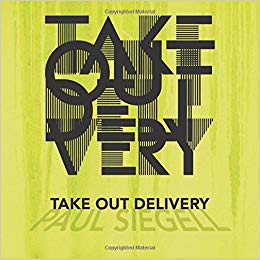|
Take Out Delivery by Paul Siegell (Spuyten Devil, 2018)
Review by Greg Bem Paul Siegell is a writer and visual artist whose sounds tear from his poems and shoot out into the ether, merging into any ear they come across. These sounds are the sounds of action and of life. They have been, in various ways, from book to book. In Take Out Delivery, Siegell’s latest collection and concept, the sounds are from poems following the dangling length of emotion, brevity, and maturity. They spear and stick, spin and wobble. They zero in and fly off within moments. They are fleeting instants, and clever ones too, that bring the reader in with a linguistic energy. The book collects poems following two different formats. The first is a sexy entangling of characterizations, what might be deemed as Siegell’s “hot pepper people” poems. Partial ASCII vispo, partial minimalist comic, these poems dot across the book showcasing subtle typographical gestures and also bringing sense through Siegell’s linguistic dexterity. In the first “hot pepper people” poem of the book (which also is the first poem of the book), one “person” expresses: “i love / party?” while the other says “we make pizza of evening!” A caption beneath the characters themselves reads: “hot pepper people / discovering their doppelganger / reaching for the same door handle.” There is a cuteness to this poem, as with the others, that is so simple yet charming, yet fiery and eruptive too. Another reads: “scantily clad / free radicals?” and “post-apocalyptic pickpockets!” and “hot pepper people / running riot at a massive, / six-turntable spectacular” conjuring the provocative, the strange, the ridiculous. The “hot pepper people” poems contain a similar tone and a similar sound across the book, while dazzling with their own shiny, unique moments. While the sequence of “hot pepper people,” complete with mellow bites of absurdity and intoxication, could stand on its own, it spices up the book by being interspersed. The bulk of the “text” of Take Out Delivery are prose poems taking from Siegell’s life. In many ways, Siegell’s work arouses a sense of the whole. In this case, the “whole” of Philadelphia is the world that Siegell builds in these poems. There are references to artists and writers living their lives in the City of Brotherly Love. Place names. Cultural mentions and abstract artifacts. An entire landscape of city life is created in a whacky and profound space. Each poem begins with “We’ve Come for Your” which lends itself to the consumerist and idolatrist sensations of the American conditioning. It’s very American. It’s very funny and, with layers of subtext, gently critical. Mostly, Siegell’s exploring the world as he does best: through the intellection of language. In “We’ve Come for Your Birth of Wordplay,” Siegell writes: “Leaks happened when sounds happened when it was hard to see. When others uttered the purpose of sound that I was made, I made the yes of sound. Strange and then OK when someone else said yes to the sound that I was made because I listened enough to know what that sound was mine, but also his and shared.” The odd, jumbling focus of this poem represents one of Siegell’s greatest strengths: to take an image, idea, or logical premise for language, and alter it just slightly enough to make it completely revitalized. In this case, there is the epiphany of shared language. In another case, in “We’ve Come for Your Blood Test Results,” the quirk is the imagery: “On the bridge, the birdgirl waits with a weight in her ribcage. Symbolically, a sailor and his sweetheart. A sparrow pecking at a cigarette. A sparrow pecking at salt for snow.” Juxtapositions reach maximal surrealistic effect. Images become layers that mask their core as the poems continue. There is hiding, revealing, fantastical moments. Just as one truth is revealed, another truth is added, releasing or solidifying that which came first. Thankfully, Siegell in his brilliant tongue doesn’t hide behind the flash of the absurd and the language for the sake of language. Instead, there are moments of the political, the social, the equitable, and the yearn for an understanding of the spectra that life affords. In these ways, Siegell is an empathetic poet. His humor is laced with a profound stretch towards the underlying meaning of and from others. “After sucking his nails to taste the dirt from underneath, a homeless man tics, ‘It doesn’t it don’t most matter if I know the news or not.’” (from “We’ve Come for Your Veterans Affairs.”) Ultimately, that sense of vision must be balanced by the humorous musings of the poet. Siegell often creates situations in his poems that form an ars poetica, a device as inward as possible. The wording may come off as objective, or displaced, but commentary on the artistic process is present and arousingly personal, as in “We’ve Come for Your Unfathomable Fact”: “When he came to, the artist to a blank canvas raced and, as if an ominous grand piano silencing a star, he ferociously blackened everything out.” This poem, like many others in the book, is a dense offering from a poet whose youthful energy is matched by a mature introspection. Whether you have encountered Siegell’s works in the past or this is your first exploration, Take Out Delivery is a rewarding collection of poems of two very different formulas that amount to an enjoyable experience. As poetry of the 21st Century, it fits right in with the soft jabs and quick mesmerizations of our digitally-dependent lives. As poetry of Philadelphia, it emulates the livelihood of a broad swath of humanity. As poetry of the heart, it laughs and emphatically pushes things forward.
0 Comments
Your comment will be posted after it is approved.
Leave a Reply. |
Welcome to Yellow Rabbits. Thanks for visiting.
All reviews by Greg Bem unless marked otherwise.
SearchYellow Rabbits Reviews
Archives by Month
August 2019
|

